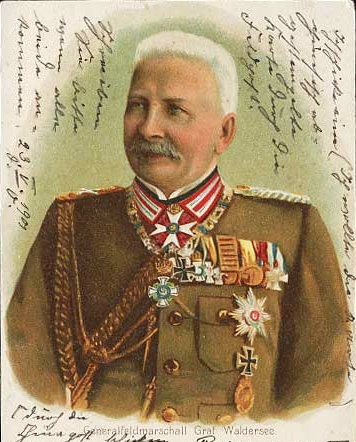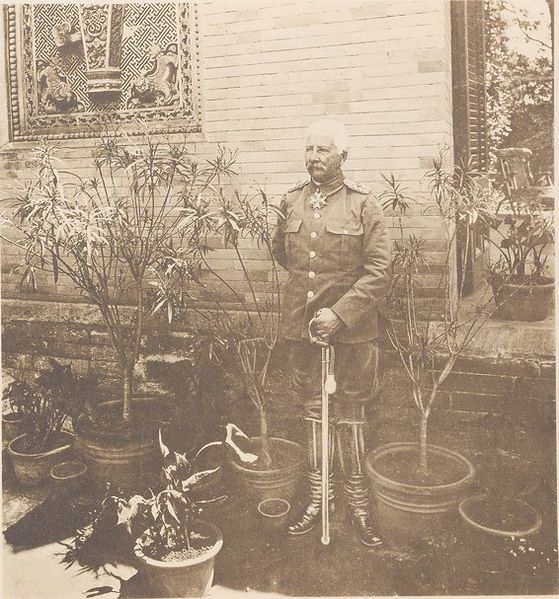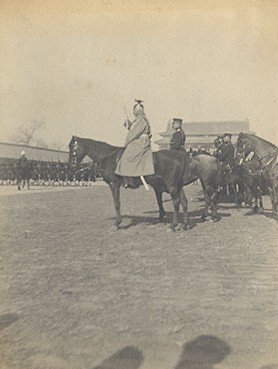<Back to Index>
- Allied Supreme Commander in China General Field Marshal Alfred Ludwig Heinrich Karl Graf von Waldersee, 1832
PAGE SPONSOR



Alfred Ludwig Heinrich Karl Graf von Waldersee (8 April 1832, Potsdam – 5 March 1904, Hanover) was a German Generalfeldmarschall who served as Chief of the Imperial German General Staff from 1888 to 1891 and as Allied Supreme Commander in China in 1900 - 1901.
Alfred von Waldersee was the fifth of six children of the Prussian cavalry general Franz Heinrich Count von Waldersee (1791 – 1873) and Bertha von Hünerbein (1799 – 1859). Franz Heinrich von Waldersee was the son of Franz Anton von Waldersee (1763 – 1823), the illegitimate son of Leopold III Friedrich Franz, Duke of Anhalt - Dessau (1740 – 1817) with Johanne Eleonore Hoffmeier (1739 – 1816). Nevertheless, Franz Anton was raised and educated at the ducal court and elevated in 1786 to Graf or Count. The Waldersee family estate, Waterneverstorf, is located on the Baltic coast near Behrensdorf in the German federal state of Schleswig - Holstein.
Alfred von Waldersee was born at Potsdam to a military and aristocratic family. After attendance at several cadet schools, he was commissioned Leutnant in 1850 in the Artillery Corps of the Prussian army. He soon attracted the favorable notice of his superiors. In his first major campaign, the Austro - Prussian War of 1866, he served as aide - de - camp to General of Artillery Prince Friedrich Karl of Prussia, with whom he was present at Königgrätz. In the course of this campaign, Count Waldersee was promoted to major and assigned to the general staff. Thereafter, he served on the staff of X Army Corps, a new formation in the conquered kingdom of Hanover. In January 1870, he became military attaché at the Paris embassy of Prussia. At this post he was able to gather intelligence on troop strengths and other information on the French military that proved valuable in the campaigns to come.
In the Franco - Prussian War, Lieutenant Colonel Count Waldersee, recognized for his military prowess and recent analysis of the adversary's armed forces, proved a most useful assistant to the "supreme War - Lord." He was present at the great battles around Metz, assigned to the staff of General Grand Duke of Mecklenburg - Schwerin; and later in operations against Chanzy's army on the Loire. The grand duke was a prominent soldier, but not a tactician of note, and the successful outcome of the western campaign was largely due to his adviser, Count von Waldersee.
At the end of the war, Waldersee received the Iron Cross First Class, and was entrusted with the difficult post of German representative at Paris, in which his tact and courtesy were marked. At the end of 1871, Waldersee took command of the 13th Uhlan Regiment at Hanover, and two years later became chief of staff of the Hanoverian army corps, in which he had served before 1870. On 14 April 1874, he married Mary Esther Lee (1837 - 1914), third daughter of the wealthy New York merchant David Lee and widow of Prince Frederick of Schleswig - Holstein. Mary had previously been created Princess of Nöer by the Emperor of Austria. She became an advocate for the poor in Prussia and was honored for her compassion.
In 1882, Waldersee was chosen by Field Marshal Helmuth von Moltke the Elder as his principal assistant on the General Staff at Berlin with the rank of Generalquartiermeister. With his selection, he was already seen as the putative successor of the octogenarian field marshal. On several occasions Waldersee accompanied Prince Wilhelm, the future Kaiser Wilhelm II, on trips abroad, representing the prince's grandfather Kaiser Wilhelm I. Out of these trips grew a tenuous teacher / student association, however, Waldersee was seen by Wilhelm's liberal parents (Crown Prince Friedrich Wilhelm and Victoria, Princess Royal) as "anti - Semitic, narrowly zealous in religion, and reactionary... the quartermaster general was the personification of everything Wilhelm's parents most detested."
Chancellor Otto von Bismarck had been in power in Prussia and Germany for a generation, but by the mid 1880s the socio - political mood in Germany was changing. Socialists were gaining seats in the Reichstag and the liberal middle class had a friend in the crown prince. Bismarck, in efforts to retain his power, now looked to an alignment with the army, but he was weary and suspicious of Waldersee. Effectively in all but title already chief - of - staff, the count was "able but extravagantly ambitious, restlessly intriguing, [and he] more or less openly aspired to the chancellorship [himself]." The General Staff knew of few of Bismarck's schemes and Waldersee's outlook was on occasion at odds with foreign policy positions held by the chancellor. Waldersee, officially still second under Moltke, had been elevating the military attachés at the Imperial embassies "into a virtually independent diplomatic service," often managing to bypass the Foreign Ministry. After one such breach of protocol was detected at the Vienna embassy, Waldersee in person was subsequently "hauled over the coals" by Bismarck, to demonstrate to the military establishment who was in charge of foreign affairs. Field Marshal Moltke finally retired in August 1888 and Waldersee's appointment to succeed him was a foregone conclusion: the newly crowned 29 year old Kaiser Wilhelm II gave his consent.
Waldersee essentially followed the Moltke line until he ran headlong into the often unpredictable young emperor. In 1891, at the autumn maneuvers [Kaisermanöver] of the Imperial Army, Waldersee had the effrontery to soundly "defeat" the formations under control of the impetuous Wilhelm II. Waldersee thus lost the confidence of his sovereign and was relieved of his duties and reassigned to command IX Army Corps at Hamburg - Altona, a clear demotion but still an assignment of importance. Waldersee, despite all that had happened, would establish his Hamburg residence near the Bismarck retirement estate at Friedrichsruh. In 1898, he was appointed inspector general of the Third Army at Hanover, the transfer orders being accompanied by eulogistic expressions of Wilhelm II's goodwill.
Two thousand European and Chinese Christians were trapped in the legation compound at Peking by Boxer insurgents in 1900. An eight - nation International Relief Force of European, American and Japanese troops maneuvered to the rescue. Since Kaiser Wilhelm II’s minister to China, Baron Clemens von Ketteler, was murdered by the Boxers, the Germans "claimed a certain priority in the crusade against Chinese barbarism." The now semi - retired, sixty - eight year old, but for the occasion newly promoted Field Marshal Alfred Count von Waldersee, was proposed by the Tsar of Russia, and seconded by the Japanese, as the first Allied Supreme Commander of modern times.
Preparations for the field marshal's departure from Germany to China caused a good deal of satirical comment on what became known as Waldersee Rummel or "Waldersee theatricals" — which he detested. Much of this circus, he wrote in his irritation "... unfortunately made it into the newspapers." Waldersee arrived at the front lines of Peking too late to direct his multinational force in any fighting of note, but was in charge of the pacification of the Boxers. "These punitive expeditions ... were unrewarding enterprises [and] from Waldersee's point of view ... hardly constituted war." It is probable, however, that "if his appointment had not existed, or if it had been filled by a less positive personality, the animosities which ceaselessly embittered the [international] contingents in North China would have assumed serious proportions. ... [In addition] there were countless minor incidents, and it is at least partly to Waldersee's credit that nothing came of them."
The field marshal did not understand the resilience of the Chinese psyche. But he understood that the conduct of the conquerors was unbecoming: their soldiery was idle and bored, venereal disease was rampant, and after looting was curtailed, the rank - and - file remained gullible enough to be swindled with "Chinese art" of all descriptions. At the end of the campaign he hastened his return to Germany. In 1901, for his "accomplishments in the interest of world peace," he was named an honorary citizen of Hamburg, his erstwhile home. Again at Hanover, he resumed the duties of inspector general, which he performed almost until his death in 1904 at age 72.
In the Hong Kong movie The Boxer Rebellion, Waldersee, played by Richard Harrison, is depicted as married to a Chinese lady who saves his life after two of the Chinese protagonists try to kill him. He is also depicted as a much younger man than he was at the time of the rebellion.